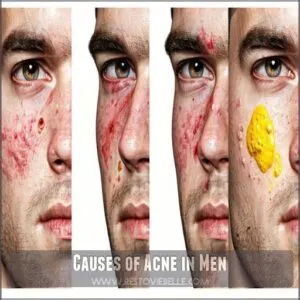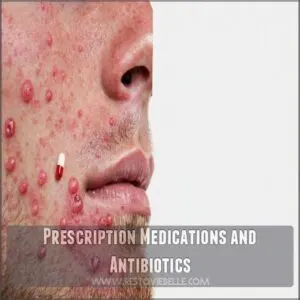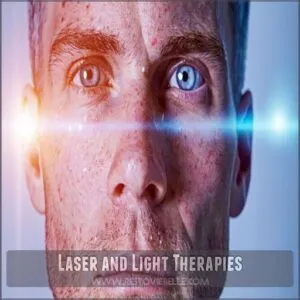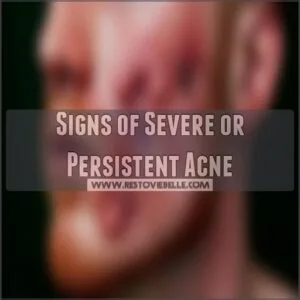This site is supported by our readers. We may earn a commission, at no cost to you, if you purchase through links.
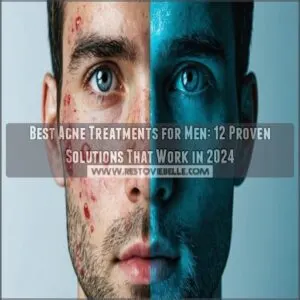 The best acne treatments for men combine skincare, medication, and lifestyle tweaks to tackle breakouts.
The best acne treatments for men combine skincare, medication, and lifestyle tweaks to tackle breakouts.
Start with over-the-counter products like benzoyl peroxide to kill bacteria or salicylic acid to unclog pores. For relentless breakouts, a dermatologist might suggest prescription options like isotretinoin or antibiotics.
Laser therapies can zap stubborn acne, and chemical peels help with scars. Stress less, eat fewer sugary snacks, and get some solid sleep—your skin will thank you!
Natural remedies like tea tree oil and aloe vera also soothe inflammation. Remember, acne doesn’t stand a chance when you mix science-backed treatments with consistency and a little patience.
Table Of Contents
- Key Takeaways
- Causes of Acne in Men
- Acne Treatment Options
- 12 Best Acne Treatments for Men
- 1. Acne Free 3 Step Treatment Kit
- 2. Neutrogena Stubborn Acne Face Treatment
- 3. Neutrogena Men Acne Face Wash
- 4. Jack Black Bump Fix Acne Treatment
- 5. Hydrocolloid Acne Pimple Patches
- 6. Differin Acne Treatment Gel 0.1 Adapalene
- 7. Neutrogena Acne Eliminating Spot Gel
- 8. Acne spot treatment cream benzoyl peroxide
- 9. Acne spot treatment with sulfur
- 10. Acne Spot Treatment Benzoyl Peroxide Gel
- 11. Origins acne spot remover gel
- 12. Fast Acting Pimple Treatment Patches
- Lifestyle Changes for Acne
- Managing Acne With Dermatologist Care
- Frequently Asked Questions (FAQs)
- What’s best for men’s acne?
- What is the best product to remove pimples for men?
- What do most dermatologists recommend for acne?
- How to fix hormonal acne in men?
- What is the best acne remover for men?
- What are the best things to get rid of acne men?
- What is the #1 way to get rid of acne?
- What are the top 3 best acne treatments?
- What is the best treatment for pimples for men?
- What is good for acne for men?
- Conclusion
Key Takeaways
- Use products with active ingredients like benzoyl peroxide and salicylic acid to fight bacteria, unclog pores, and tackle breakouts effectively.
- For severe acne, consult a dermatologist for prescription treatments like isotretinoin, antibiotics, or laser therapies.
- Manage your acne triggers by reducing stress, getting more sleep, and maintaining a diet low in sugar and dairy while rich in omega-3s.
- Stick to a consistent skincare routine with cleansing, moisturizing, and sunscreen to maintain clear, healthy skin.
Causes of Acne in Men
Your acne troubles often start with a perfect storm of hormones, genetics, and lifestyle factors that can turn your face into an unwanted battlefield.
While you can’t control your genes or hormones, you’ll be glad to know that understanding these triggers is your first step toward clearer skin.
Hormonal Changes and Testosterone
Your body’s testosterone levels are like a double-edged sword in relation to acne. These hormonal changes trigger increased oil production in your skin, leading to clogged pores and breakouts. While testosterone is essential for male development, its fluctuations can wreak havoc on your skin.
- Stress spikes your hormone levels, turning your face into an oil factory
- Late nights and intense workouts can amplify hormonal fluctuations
- Your morning grooming routine might be working against your hormones
- Those post-gym breakouts? Blame the testosterone surge from exercise
Genetics and Family History
While testosterone drives breakouts, genetic predisposition plays an equally powerful role in adult male acne. Studies show that inherited acne can increase your risk by 2.3 to 4.7 times.
Family traits influence everything from oil production to how your skin responds to treatment.
Recent research confirms that hereditary factors shape the severity and pattern of breakouts, making personalized male acne treatments more important than ever.
Stress and Lifestyle Factors
Stress can trigger a cascade of hormonal changes that directly impact your skin.
When stress levels spike, your body releases cortisol, which stimulates oil production and leads to breakouts.
Modern lifestyle factors like irregular sleep patterns and packed schedules intensify this effect.
Implementing stress management techniques and maintaining consistent relaxation practices helps regulate these hormonal fluctuations, making them powerful tools in mens skincare routines.
Diet and Nutrition Impact
Your diet choices pack a surprising punch regarding acne. Recent studies show that high sugar intake and glycemic foods can trigger breakouts, while dairy effects are particularly strong in men.
A healthy diet rich in omega-3s actually reduces acne, and smart meal planning helps maintain nutrient balance.
Food allergies might be sneaking up on your skin – what you eat today shows up on your face tomorrow.
Environmental Factors and Pollution
Modern city life bombards your skin with air pollution and environmental factors that trigger acne flare-ups.
Recent research shows that exposure to pollutants oxidizes skin oils and activates inflammation, while hot, humid climates boost oil production.
Urban pollution particles mix with sweat and dead skin cells, leading to clogged pores. Climate change and poor water quality further stress your skin’s natural defense system, making acne management more challenging with environmental factors.
Acne Treatment Options
You’ll find proven treatments ranging from over-the-counter products to professional procedures that can effectively clear your acne.
Whether you’re dealing with occasional breakouts or persistent cystic acne, modern treatment options combine powerful medications, advanced therapies, and targeted solutions to help you achieve clearer skin.
Prescription Medications and Antibiotics
Recent updates in acne medications bring new hope for clearer skin. Prescription treatments range from potent oral antibiotics like doxycycline to targeted topical solutions.
While bacterial growth responds well to these medications, doctors now carefully monitor antibiotic resistance patterns. For severe cases, isotretinoin remains highly effective, though medication side effects require close supervision.
Novel formulations and fixed-dose combinations offer promising alternatives for skin infection control. Additionally, many patients find relief with over-the-counter acne treatment options that are gentle on the skin.
Laser and Light Therapies
When traditional treatments fall short, laser and light therapies offer powerful solutions for stubborn acne.
These advanced treatments use specific wavelengths to target bacteria and reduce inflammation, making them especially effective for men with persistent breakouts.
- Blue light therapy destroys acne-causing bacteria while calming inflammation
- Red light therapy penetrates deeper to heal scarring and reduce redness
- Photodynamic treatment combines light therapy with specialized solutions for severe cases
12 Best Acne Treatments for Men
You’ll find proven treatments that work for every type of acne, from stubborn spots to severe breakouts.
These solutions combine the latest skincare technology with trusted ingredients like benzoyl peroxide and salicylic acid to help you achieve clearer, healthier-looking skin.
1. Acne Free 3 Step Treatment Kit
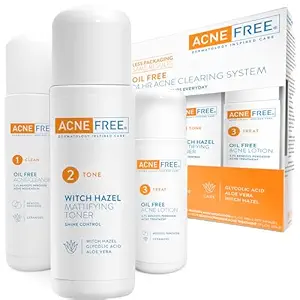
The frustration of stubborn acne meets its match in the Acne Free 3 Step Treatment Kit. You’ll find a complete solution with its oil-free cleanser, witch hazel mattifying toner, and benzoyl peroxide lotion working together to tackle mild to severe breakouts.
Dermatologists recommend this system for its gentle yet effective approach. Users report noticeable improvements within days, though it’s not an overnight miracle.
The kit shines in its dual action – fighting active acne while preventing new breakouts, all without over-drying your skin with a complete solution and gentle yet effective approach, providing noticeable improvements and using benzoyl peroxide lotion.
Best For: People with mild to severe acne looking for a complete treatment system that’s gentle enough for daily use while being tough on breakouts.
- Comprehensive three-step system with cleanser, toner, and treatment lotion that work together for maximum effectiveness
- Formulated with proven ingredients like benzoyl peroxide and witch hazel that target both active breakouts and prevention
- Suitable for sensitive skin types without causing excessive dryness or irritation
- Results aren’t immediate and require consistent use over time to see significant improvement
- Some users may experience initial dryness while skin adjusts to the treatment
- May be more steps than some users want to commit to in their daily routine
2. Neutrogena Stubborn Acne Face Treatment
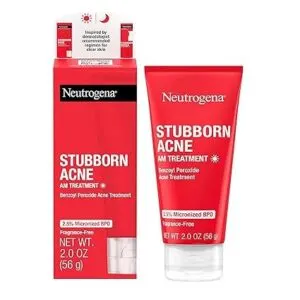
You’ll find quick relief with Neutrogena’s Stubborn Acne AM Treatment, backed by impressive clinical results showing clearer skin in just four weeks for 86% of users.
This oil-free formula contains 2.5% micronized benzoyl peroxide that dives deep into pores, tackling acne-causing bacteria at their source.
The vanishing formula works throughout the day, reducing both size and redness of breakouts within 4 hours. Free from parabens, phthalates, dyes, and fragrances, it’s gentle enough for daily use yet powerful enough to deliver visible results.
Best For: People struggling with stubborn acne who want a gentle yet effective daily treatment that shows quick results without harsh ingredients or fragrances.
- Fast-acting formula shows visible reduction in acne size and redness within just 4 hours of application
- Clinically proven effectiveness with 86% of users seeing clearer skin after four weeks of consistent use
- Gentle 2.5% benzoyl peroxide formula is free of common irritants like fragrances, dyes, and parabens
- Some users report skin dryness and irritation, especially during initial use
- May bleach fabrics and clothing despite lower benzoyl peroxide concentration
- Must be paired with PM treatment for optimal results, increasing overall skincare costs
3. Neutrogena Men Acne Face Wash
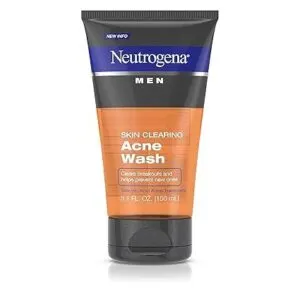
Battle stubborn breakouts with Neutrogena Men’s Skin Clearing Face Wash, a daily cleanser powered by 2% salicylic acid. This non-comedogenic formula tackles existing acne while preventing future flare-ups, making it ideal for acne-prone skin.
Simply wet your hands, work up a lather, and massage it into your face – then rinse thoroughly. What sets it apart? It eliminates excess oil without over-drying, and surprisingly, it helps smooth out those annoying neck shaving bumps.
For best results, use it consistently as part of your daily skincare routine.
Best For: Men struggling with acne breakouts and post-shave irritation who need a daily cleanser that won’t dry out their skin.
- Contains 2% salicylic acid, a proven acne-fighting ingredient that helps prevent and treat breakouts effectively
- Non-comedogenic formula cleanses deeply while balancing oil production, making it suitable for daily use
- Works double duty by helping reduce razor bumps and post-shave irritation on the neck area
- May be too strong for those with sensitive skin or mild acne
- The 5.1 oz size might run out quickly with regular daily use
- Higher price point compared to basic facial cleansers, though it’s currently 15% off
4. Jack Black Bump Fix Acne Treatment
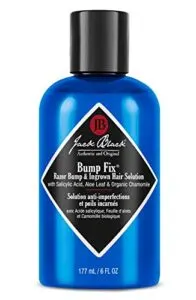
Designed for men’s naturally oilier skin, Jack Black Bump Fix Acne Treatment tackles breakouts with a precise, two-step approach.
This specialized formula dives deep into pores, controlling excess shine while thoroughly cleansing your skin. Its powerful exfoliating agents work systematically to unclog blocked pores and prevent future congestion.
For best results, follow up with an acne-friendly moisturizer to maintain your skin’s balance. The thorough treatment helps manage stubborn acne effectively, making it easier to achieve and maintain clearer skin without excessive dryness or irritation, using a two-step approach.
Best For: Men with oily, acne-prone skin looking for a targeted treatment that effectively controls shine and prevents breakouts.
- Contains powerful exfoliating agents that deeply cleanse pores and prevent future blockages
- Specifically formulated for men’s naturally oilier skin type
- Two-step approach ensures thorough treatment while maintaining skin balance
- Requires following up with a separate moisturizer for best results
- May cause initial dryness during skin adjustment period
- Limited to treating facial acne rather than body acne
5. Hydrocolloid Acne Pimple Patches
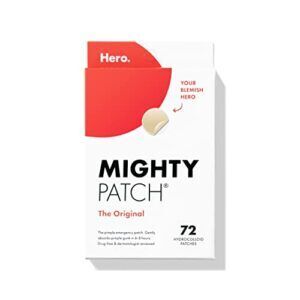
These innovative hydrocolloid patches work like magic overnight, absorbing pimple impurities without the need to pop them.
Their medical-grade composition guarantees strong adhesion while you sleep, yet they remove easily in the morning without causing redness or irritation.
You’ll appreciate how the translucent matte finish blends seamlessly into your skin, making them discreet enough for daytime wear, with a translucent matte finish that is perfect for spot treatments.
These UV-sterilized patches show visible results in just 6-8 hours, giving you a clearer face by morning, and are allergy-tested.
Best For: Those looking for a quick, easy, and non-irritating solution to reduce pimples overnight without popping them.
- Absorbs impurities effectively overnight with medical-grade hydrocolloid.
- Strong adhesion for all-night wear yet easy to remove without redness or irritation.
- Discreet translucent matte finish suitable for both day and night use.
- Only available in one size (12mm medium dots).
- Results may vary depending on the severity of the pimples.
- Not ideal for treating deeply rooted or cystic acne.
6. Differin Acne Treatment Gel 0.1 Adapalene
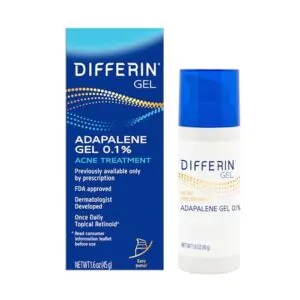
Got a stubborn breakout? Differin Acne Treatment Gel 0.1 Adapalene dives deep to tackle acne where it starts—those clogged pores and pesky inflammations.
Packed with a powerful retinoid, adapalene, it normalizes skin cell turnover while keeping irritation low. In just 12 weeks, you could see up to an 87% reduction in acne.
It’s fragrance-free, non-comedogenic, and plays well in your daily routine. Whether it’s maskne or hormonal breakouts, this gel’s got your back, delivering prescription-strength results without a trip to the dermatologist!
Best For: Those dealing with persistent acne, including mask-related breakouts, who want a dermatologist-recommended, over-the-counter treatment.
- Contains Rx-strength adapalene to clear and prevent acne.
- Fragrance-free, non-comedogenic, and gentle on most skin types.
- Reduces acne by up to 87% in 12 weeks with consistent use.
- May cause an initial "purge phase" where acne temporarily worsens.
- Can make skin sensitive, requiring extra care with moisturizers and masks.
- Not a quick fix; long-term, consistent use is required for best results.
7. Neutrogena Acne Eliminating Spot Gel
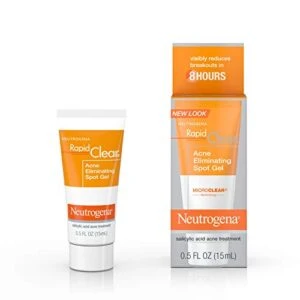
If you’re fighting breakouts and want quick results, Neutrogena Acne Eliminating Spot Gel is your secret weapon.
Packed with 2% salicylic acid, it targets pimples fast and prevents future intrusions. This oil-free, non-comedogenic formula won’t clog pores, making it great for acne-prone or sensitive skin.
Apply directly at the first sign of trouble—two applications daily usually do the trick. Sure, the bottle might dispense a bit unevenly, but the clear skin payoff makes it worth it. Perfect for spot treatment emergencies!
Best For: People with acne-prone or sensitive skin who need an effective spot treatment for quick results.
- Contains 2% salicylic acid to treat and prevent breakouts.
- Oil-free and non-comedogenic, safe for sensitive skin.
- Works fast to reduce redness and clear blemishes.
- Bottle can dispense unevenly if squeezed too hard.
- Price is higher than some similar products.
- May take up to a week for visible results on some blemishes.
8. Acne spot treatment cream benzoyl peroxide
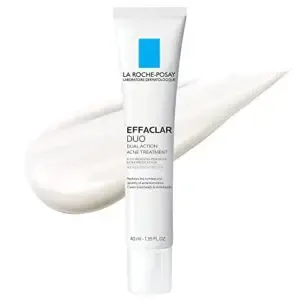
When battling stubborn blemishes, La Roche-Posay’s acne spot treatment cream stands out with its 5.5% micronized benzoyl peroxide formula.
It works fast, reducing breakouts, blackheads, and whiteheads by 60% in just 10 days. The micro-exfoliating lipo-hydroxy acid gently clears clogged pores while the non-drying, oil-free formula suits sensitive skin.
Whether tackling red, raised pimples or using it as an all-over treatment, this cream delivers real results. Just remember—less is more to avoid irritation. A win for quick, effective acne management.
Best For: Those with sensitive skin looking for a fast-acting acne treatment that targets blemishes, blackheads, and whiteheads.
- Reduces acne by 60% in just 10 days.
- Non-drying, oil-free formula suitable for sensitive skin.
- Can be used as a spot treatment or all-over face application.
- May cause dryness or flakiness, especially for dry skin types.
- Can cause irritation if too much product is applied.
- Burning sensation may occur for those with very sensitive skin.
9. Acne spot treatment with sulfur
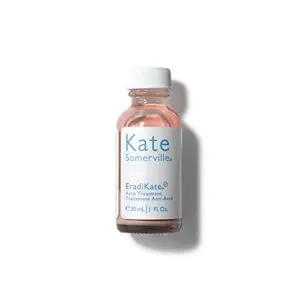
Packed with a punch, sulfur-based acne spot treatments target blemishes with precision.
Known for its ability to reduce redness, inflammation, and irritation, sulfur clears pimples by removing dead skin cells and drying out excess oil.
Products like EradiKate or De La Cruz’s 10% Sulfur Ointment work particularly well on stubborn breakouts.
Apply a small amount directly onto problem areas, let it sit overnight, and wake up to visibly calmer skin. Just remember—moisturize afterward to avoid over-drying. Give sulfur a shot—it’s surprisingly effective!
Best For: People with oily or acne-prone skin looking for a targeted treatment to reduce breakouts quickly.
- Reduces redness and inflammation effectively.
- Works fast, with visible results in as little as one hour.
- Suitable for sensitive skin when used correctly.
- Can cause dryness or irritation if overused.
- Has a noticeable sulfur smell.
- Requires careful application to avoid over-drying surrounding areas.
10. Acne Spot Treatment Benzoyl Peroxide Gel
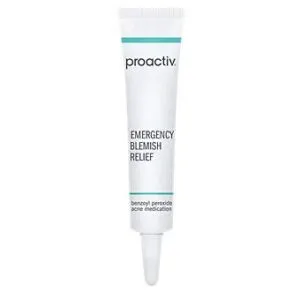
If you’re tackling sudden breakouts, acne spot treatment benzoyl peroxide gel might just be your secret weapon.
This powerhouse gel dives deep into pores, targeting acne-causing bacteria and cutting down excess oil. Its fast-acting formula can reduce blemishes overnight in some cases, helping prevent new breakouts without a strong scent.
Perfect for on-the-go use, it’s slim enough to slip into your pocket. Just be careful if you’ve got sensitive skin, as benzoyl peroxide can sometimes cause dryness or irritation, which is a consideration for sensitive skin.
Best For: People dealing with emergency blemishes who want a quick and portable acne spot treatment.
- Reduces blemishes quickly, with visible results sometimes by the next morning.
- Pocket-sized and easy to use on the go.
- Unscented gel formula suitable for teens and adults.
- May cause dryness or irritation, especially for sensitive skin.
- Small product size might not last long with frequent use.
- Expiration date concerns reported by some users.
11. Origins acne spot remover gel
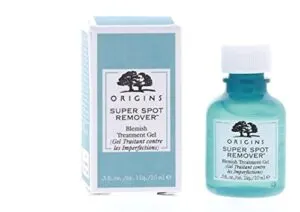
Origins Super Spot Remover Acne Treatment Gel is a game-changer for tackling stubborn blemishes.
Infused with salicylic acid, it dives deep into clogged pores, clearing debris and reducing inflammation.
Designed for normal, oily, and combination skin, it’s a perfect choice for spot treating acne flare-ups quickly, with some users even rave about visible results overnight.
Apply 1-3 times daily, but scale back if dryness or peeling creeps in.
Best For: Adults with normal, oily, or combination skin looking for a quick and effective spot treatment for acne.
- Contains salicylic acid to target clogged pores and clear blemishes.
- Compact and portable for on-the-go application.
- Users report fast results, sometimes visible overnight.
- Can cause dryness or peeling with frequent use.
- Not suitable for all skin types; sensitive skin may react.
- Requires careful reading of ingredient list and instructions.
12. Fast Acting Pimple Treatment Patches
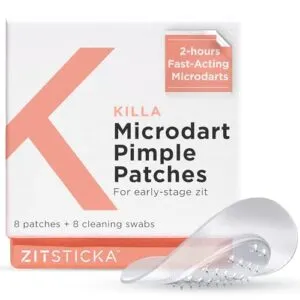
Fast-acting pimple treatment patches, like ZitSticka’s KILLA Kit, are lifesavers for sudden breakouts.
They are packed with microdarts, which painlessly deliver acne-fighting ingredients—salicylic acid, niacinamide, and oligopeptide-76—deep into emerging zits.
Designed for those painful under-the-surface bumps, these patches reduce swelling and speed up healing in just hours.
Their vegan, cruelty-free formula works wonders on stubborn blemishes while keeping it ethical.
Though a bit pricey, their effectiveness makes them worth it for occasional flare-ups.
Perfect for when you need quick, discreet results.
Best For: Those dealing with deep, under-the-surface pimples or stubborn early-stage breakouts who need quick, targeted relief.
- Reduces swelling and speeds up healing in as little as 2 hours.
- Painless microdart technology delivers acne-fighting ingredients directly to the source.
- Vegan, cruelty-free, and free of dyes, sulfates, and parabens.
- Expensive compared to other pimple patches.
- Packaging might feel excessive for some users.
- May not show significant results for every skin type or breakout.
Lifestyle Changes for Acne
You can control acne by tweaking your daily habits, like eating smarter and managing stress.
Small changes, such as getting more sleep or exercising regularly, can make a big difference in keeping breakouts at bay.
Dietary Adjustments to Reduce Breakouts
Small tweaks to your diet can pay off big.
Cut back on sugar and refined carbs—they spike insulin and trigger oil production.
Boost gut health with probiotics, and opt for omega-3-rich foods like salmon to reduce inflammation.
Balance water intake for hydrated skin, and avoid skim milk, which can worsen acne.
For persistent pimples, consider using an acne spot treatment.
Nutrition planning supports clearer, healthier skin.
Stress Management Techniques
Stress wreaks havoc on your skin, but relaxation techniques can help! Consider these stress management methods:
- Practice mindfulness exercises to anchor your thoughts.
- Use deep breathing to calm your body during hectic days.
- Try yoga practices, combining movement with meditation techniques.
- Explore relaxation methods like progressive muscle relaxation for tension release.
Less stress means fewer breakouts and healthier skin!
Exercise and Its Impact on Skin Health
Exercise isn’t just for muscles – it’s a secret weapon for clearer skin.
A solid fitness routine boosts blood flow, helping with skin detox and delivering that healthy glow. However, sweat management is key; trapped sweat can lead to breakouts.
Showering post-workout and wearing breathable fabrics can prevent clogged pores. Pair exercise benefits with smart skincare for men, and you’re golden!
Sleep Habits for Clearer Skin
Good sleep patterns are like your skin’s secret weapon. During restful nights, your body focuses on skin regeneration, repairing damage and reducing inflammation.
A consistent bedtime ritual, paired with a calming skincare routine, sets the tone for clearer mornings.
Avoid late-night stress or screens—these derail good rest and acne treatments for men. A solid lifestyle starts at night!
Natural Ingredients for Acne Treatment
Tea tree oil’s antibacterial punch makes it a top pick for zapping blemishes, while aloe vera gel soothes redness like a pro.
Got stubborn spots? Mix bentonite clay with turmeric powder for a detox mask. Coconut oil hydrates without clogging pores, and green tea or zinc can tame inflammation.
For more information on Tea Tree products, consider exploring natural remedies. Simple, effective, and natural acne treatments don’t have to be complicated!
Managing Acne With Dermatologist Care
When over-the-counter treatments don’t cut it, seeing a dermatologist can give you access to powerful, personalized solutions for your acne.
They’ll assess your skin, recommend effective medications or procedures, and help you manage stubborn cases with a long-term plan, using personalized solutions.
Signs of Severe or Persistent Acne
Persistent acne isn’t just an annoying breakout—it can hit harder. Keep watch for these telltale signs:
- Painful, deep cysts or nodules that often leave scars.
- Widespread inflammation on your face, chest, or back.
- Mixed lesions, including clogged pores and redness, affecting self-confidence.
If this sounds familiar, it’s time to rethink your acne treatment for men strategy.
Prescription Treatments for Men
If OTC products aren’t cutting it, prescription treatments might be your next step.
Doctors often recommend acne medication like isotretinoin (Accutane) for severe cases or antibiotics for inflamed breakouts.
Hormonal acne? Adjusting male hormones can help too. Keep an eye on skin reactions and always consult your doctor for the right acne therapy.
| Medication | Purpose | Potential Side Effects | Notes |
|---|---|---|---|
| Isotretinoin | Severe acne | Dryness, irritation | Requires close monitoring |
| Antibiotics | Reduce inflammation | Stomach upset, resistance | Short-term use advised |
| Hormone Therapy | Balance hormones | Mood changes | For hormone-driven cases |
| Retinoids | Exfoliation | Redness, peeling | Gradual skin adjustment |
Professional Procedures for Acne Scars
Got stubborn scars? Professional procedures like laser skin treatment and chemical peels can smooth things out, while microdermabrasion exfoliates the top layer for a fresh start.
Dermal fillers can plump indents. For deeper scarring, fractional laser therapy goes below the surface.
Pair these with facials or extractions, and you’re set to regain confident, clear skin.
Combination Therapies for Stubborn Cases
Combination therapies are game-changers for stubborn acne, merging medical interventions with effective acne fighting products.
Elevate your acne management with these options:
- Retinoids + Benzoyl Peroxide: Unblock pores and reduce bacteria.
- Antibiotics + Benzoyl Peroxide: Tackle inflammation effectively.
- Retinoids + Antibiotics: Perfect for severe cases.
- Hormonal Therapies + Topicals: Balance skin naturally.
- Customized Treatment Plans: Personalized therapies by dermatologists guarantee the best acne treatments for men.
Follow-up Care and Maintenance
Stick to a consistent skincare routine for men to maintain clear skin after treatment. Follow your dermatologist’s advice for any medications or topical treatments.
Regular follow-ups help track progress, tweak plans, and prevent future breakouts. Implement acne prevention steps like cleaning pillowcases, avoiding harsh scrubs, and managing stress.
Skincare tips? Simple: cleanse, moisturize, and always use sunscreen.
Frequently Asked Questions (FAQs)
What’s best for men’s acne?
Use products with benzoyl peroxide or salicylic acid for breakouts.
For stubborn acne, retinoids or dermatologist-prescribed treatments like isotretinoin work wonders.
Don’t forget regular cleansing, proper shaving, and eating clean—it all adds up.
What is the best product to remove pimples for men?
Think of your skin as a battlefield—benzoyl peroxide (5-10%) clears bacteria while salicylic acid unclogs pores.
Retinoids like Differin smooth scars.
Stick to a routine, and don’t skip sunscreen—it’s your skin’s armor.
What do most dermatologists recommend for acne?
Dermatologists often recommend a combo of benzoyl peroxide, salicylic acid, and retinoids to clear acne.
For stubborn cases, they might prescribe antibiotics, isotretinoin, or suggest laser therapy.
Stick with consistent care, and results will follow!
How to fix hormonal acne in men?
Hormonal acne feels like an unfair battle, but targeting testosterone-driven oil production is key.
Use retinoids to unclog pores, benzoyl peroxide to kill bacteria, and reduce stress, dairy, and sugar to calm breakouts naturally.
What is the best acne remover for men?
Benzoyl peroxide face washes, salicylic acid cleansers, and retinoid creams work wonders for men’s acne.
For stubborn cases, consult a dermatologist about stronger treatments like isotretinoin or laser therapy.
Be consistent, and results will follow!
What are the best things to get rid of acne men?
Stick to a simple routine: wash with a gentle cleanser, use salicylic acid or benzoyl peroxide, and moisturize.
Add retinoids for stubborn spots.
Avoid picking, eat clean, manage stress, and get enough sleep.
What is the #1 way to get rid of acne?
Picture cleaning a messy desk—removing clutter clears space.
For acne, focus on consistency: wash twice daily with salicylic acid, moisturize, and use benzoyl peroxide.
Keep it simple and stick with a routine.
What are the top 3 best acne treatments?
Start with a retinoid to unclog pores and boost skin turnover.
Add benzoyl peroxide for bacteria-fighting power.
For stubborn acne, try laser treatments like AviClear, offering long-term results by targeting oil production deep in the skin.
What is the best treatment for pimples for men?
Stick to basics: use salicylic acid or benzoyl peroxide cleansers daily to tackle breakouts.
For stubborn pimples, try retinoid creams like Differin.
Consult a dermatologist for severe acne or prescription solutions like isotretinoin.
What is good for acne for men?
Banish those pesky bumps by using products with salicylic acid or benzoyl peroxide.
Treat stubborn spots with retinoids, and don’t skip sunscreen!
Clean shaving, healthy eating, and managing stress are your secret weapons for clear skin.
Conclusion
What’s the secret to choosing the best acne treatments for men that actually work?
It’s all about balancing targeted products, effective dermatologist-backed options, and smarter daily habits.
From benzoyl peroxide gels and hydrocolloid patches to dietary improvements and managing stress, consistency is key.
Whether you go for over-the-counter solutions or prescription treatments, patience and proper care will deliver results.
Don’t let acne define you—take control of your skin with proven strategies and build a routine that works in 2024.
- https://www.zocdoc.com/wl/schweigerderm/search?address=New+York%2C+NY&after_5pm=false&before_10am=false&day_filter=AnyDay&dr_specialty=101&filters=%7B%7D&gender=-1&insurance_carrier=-1&insurance_plan=-1&ip=158.106.220.242&language=-1&offset=0&reason_visit=84&search_query=Dermatology+Consultation&sees_children=false&sort_type=Default
- https://www.birchbox.com/collections/skincare
- https://www.menshealth.com/grooming/g22686394/best-moisturizer-for-men/
- https://pmc.ncbi.nlm.nih.gov/articles/PMC2836431/
- https://www.schweigerderm.com/skin-care-articles/acne/best-acne-treatment-for-men/
